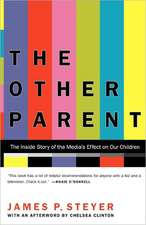The Good Carbohydrate Revolution: A Proven Program for Low-Maintenance Weight Loss and Optimum Health
Autor Dr. Terry Shintanien Limba Engleză Paperback – 2003
A SCIENTIFICALLY PROVEN BREAKTHROUGH IN NUTRITIONAL WEIGHT-LOSS RESEARCH THAT CAN HELP YOU TO LOSE WEIGHT AND CONTROL YOUR BLOOD SUGAR LEVELS BY EATING MORE OF THE RIGHT KIND OF CARBOHYDRATES.
In his bestselling book The HawaiiDiet™, Dr. Terry Shintani showed readers how they could eat nearly twice as much food as they usually do and still lose weight. Now, as a much-needed voice of reason amid today's clamor of weight-loss programs that eliminate carbohydrates from the diet in favor of protein-only foods, Dr. Shintani returns with a revolutionary approach to weight-maintenance and total-body health. Here, you'll learn how to:
• Identify the "good" carbohydrates, from whole-grain pasta and pita bread to sweet potatoes and brown rice, as well as an array of vitamin-rich fruits and vegetables
• Lower your cholesterol and blood pressure, and control your blood sugar levels to help prevent the onset of osteoporosis, cancer, stroke, and other serious illnesses
• Design a delicious, affordable 21-day meal plan to get you started on the path toward weight loss and total-body wellness
...and much more. Whether you're seeking permanent weight loss, lower cholesterol, or a crash-course in good nutrition, The Good Carbohydrate Revolution promises to make eating well -- and staying well -- easier to achieve than ever before.
Preț: 157.89 lei
Nou
Puncte Express: 237
Preț estimativ în valută:
30.21€ • 31.55$ • 24.95£
30.21€ • 31.55$ • 24.95£
Carte disponibilă
Livrare economică 25 martie-08 aprilie
Preluare comenzi: 021 569.72.76
Specificații
ISBN-13: 9780743405997
ISBN-10: 0743405994
Pagini: 448
Dimensiuni: 140 x 216 x 25 mm
Greutate: 0.47 kg
Ediția:Reprint
Editura: ATRIA
Colecția Atria Books
ISBN-10: 0743405994
Pagini: 448
Dimensiuni: 140 x 216 x 25 mm
Greutate: 0.47 kg
Ediția:Reprint
Editura: ATRIA
Colecția Atria Books
Notă biografică
Terry Shintani, M.D., J.D., M.P.H., received his master's degree in nutrition from Harvard University, and his medical and law degrees from the University of Hawaii. He is on the clinical faculties at the University of Hawaii School of Medicine and Department of Public Health, and acts as director of integrative medicine at the Waianae Coast Comprehensive Health Center. Dr. Shintani is the author of The HawaiiDiet™, also available from Pocket Books.
Extras
Chapter 1: You Can Benefit from the Good Carbohydrate Plan
You can benefit from the Good Carbohydrate Plan because everyone -- including those on high protein diets -- eats carbohydrates. If you answer yes to any of the following questions, the Good Carbohydrate Plan will be of enormous benefit to you.
My patients have followed the principles of the Good Carbohydrate Plan and have successfully met these health challenges -- some of them in as little as three weeks. What's more, when they continue to follow the principles, they experience the results for a lifetime.
WHAT IS THE GOOD CARBOHYDRATE PLAN?
The Good Carbohydrate Plan is a high carbohydrate eating plan that helps you control your weight, your blood sugar, and your cholesterol permanently by changing the sources of carbohydrates in your diet. I have used this plan for nearly fifteen years to help my patients lose weight naturally and control their blood sugar without calorie counting. It is centered on good carbohydrates -- those that provoke the smallest rise in blood sugar and insulin -- and can be tailored to your individual needs.
The Good Carbohydrate Plan translates the latest scientific research about carbohydrates and other nutrients into a set of principles called The Five C's for finding good carbohydrates and a table I call the Carbohydrate Quotient to help you with your food choices. I've also included in this book recipes and tips on how you can make the most of good carbohydrates.
Let me emphasize that the Good Carbohydrate Plan is a flexible plan. It is not a one-diet-fits-all or an all-or-nothing plan. With the Good Carbohydrate Plan, you can tune up whatever diet you are on by replacing bad carbohydrates with good ones. Every good carbohydrate you add to your diet to replace a bad carbohydrate will be of benefit to you. Or you can try a complete version of the Good Carbohydrate Plan and obtain the maximum result of controlling blood sugar and cholesterol without medication. You'll begin with good carbohydrates as the core of the diet and add optional foods to create healthy diets such as vegetarian, Mediterranean, or Asian.
And here's the best part. The Good Carbohydrate Plan does not restrict the amount of food that you eat. It allows you to eat more carbohydrates while you control blood sugar, and helps bring your cholesterol levels to a safe range, i.e., below 170 mg/dl. You'll be able to eat whenever you feel hungry, and enjoy delicious, healthy foods for the rest of your life.
WHY A BOOK ABOUT CARBOHYDRATES?
I'm writing this book because there has been a lot of misinformation and confusion about carbohydrates over the last few years. Most of the popular literature on dieting these days touts the benefits of protein while bashing carbohydrates. They say that carbohydrates cause everything from obesity, diabetes, heart disease, to high blood pressure. Meanwhile, I have been reversing these same conditions with a high carbohydrate diet for over a decade using large amounts of the very foods that some have said would cause these diseases. Something is terribly wrong! The public is getting the wrong message.
Because of all the misinformation, many Americans are steering clear of exactly the foods they need to be healthy, trim, and fit. One popular protein diet book on its back cover indicates that carrots may be a food to avoid. Carrots unhealthy for you? No way! I want to set the record straight. Carbohydrates have been the cornerstone of health for the human race for thousands of years. Carbohydrates are also the center of the plan that I have been using for nearly fifteen years to get people to control their blood sugar, cholesterol, and weight, and regain their health as a result.
WHY THE GOOD CARBOHYDRATE PLAN?
I was born, raised, and still live in Hawaii where we have the advantage of being at the crossroads between East and West. Here, I am able to see firsthand the differences between a variety of diets and the health of the people on these diets. When I was studying medicine, I began to notice that the ancestors of the people who live in Hawaii -- the people from Asia, Polynesia, Hawaii, the Mediterranean -- all seemed to have quite good health. When their descendants moved to Hawaii, they began eating a Modern American Diet (MAD) and started to have high rates of obesity, cardiovascular disease, and diabetes like the majority of the United States population.
Modern people who base their diets on traditional eating patterns experience a fraction of the heart disease, obesity, diabetes, and other chronic diseases that have reached epidemic proportions in the United States. China and Japan are two obvious examples of cultures that eat very high carbohydrate diets and have populations with low rates of obesity, heart disease, breast cancer, prostate cancer, and diabetes.
Considering the grim statistics -- nearly one-third of all Americans die of heart disease, nearly one quarter of all Americans die of cancer, 7 percent die of stroke, and diabetes has increased 33 percent in the last ten years -- I thought this sharp contrast of the low rates of diseases in other countries compared to the United States was so important that I looked at this relationship more carefully. I began to realize that the populations with low rates of chronic diseases ate large amounts of what I call good carbohydrates. In fact, in ancient times over 80 percent of calories came from good carbohydrate foods. By sharp contrast, in modern times with our fast food, high fat, high animal product, high sugar diet, less than 15 percent of the American diet comes from good carbohydrates (see diagram, page 27). This is one of the fundamental reasons why our MAD diet is causing obesity and so many ill health effects.
To prevent and reverse some of the obesity and chronic diseases that plague so many of us, I developed the principles of the Good Carbohydrate Plan while studying nutrition at Harvard University. I launched my practice and a number of nutrition programs in Hawaii fourteen years ago based on the principles of the Good Carbohydrate Plan. Since then, I have been blessed to see thousands of people benefit from these principles, including, for many, life-changing improvements in their weight and health. I am writing this book to show you how you too can enjoy better health and natural weight control on the Good Carbohydrate Plan.
Getting to the Real Problem
The reason the Good Carbohydrate Plan works so well is that it gets to the real problem. The problem is not that we are eating too many carbohydrates. The problem is that we are eating too many bad carbohydrates along with too much fat and animal products. Americans are eating more refined carbohydrates than ever. We now eat a record high of 33 teaspoons of sugar per person per day. We also consume an average of 149.7 pounds of flour products per person per year, with less than 2 percent of it coming from whole grain. The American diet is loaded with refined white flour and white sugar -- bad carbohydrates -- the very opposite of what we need for optimum health.
The American diet is also far too high in fat, cholesterol and animal products. Contrary to what some popular diet proponents have suggested, dietary fat intake continues to increase in this country. Objective data from the USDA for the years 1970-1999 shows that while sugar intake has increased dramatically, fat intake has gradually increased to record high levels, and we are eating more animal products than ever.
As you will see in the research I describe in Chapter 3, the solution to the American diet problem isn't replacing bad carbohydrates with protein and fat. The solution is in replacing bad carbohydrates with health-promoting good carbohydrates.
CARBOHYDRATES ARE NOT THE CULPRIT
In the age of so-called protein diets, carbohydrates have been labeled the guilty culprit. As a result, many Americans are afraid to chomp down on a nice crunchy carrot, eat a bowl of brown rice, or bite into a delicious slice of whole grain bread! Let's look at some of the reasons why all carbohydrates have been wrongly lumped together as bad.
Much of the recent evidence against carbohydrates is based on the actions of the hormone, insulin. Insulin is an important hormone in your body that is secreted into your bloodstream to process carbohydrates. While everyone needs the insulin their body makes, according to some recent research I describe in Chapter 3 on the relationship between insulin levels and health, having too much insulin circulating in your blood can be related to heart disease, obesity, and other health problems. There is also some evidence that in some people, high insulin levels may cause a cluster of health problems called Syndrome X, or Metabolic Syndrome. This syndrome includes high blood sugar, high blood pressure, and abnormal cholesterol levels.
Since carbohydrates have the potential for raising insulin levels, this has led some high-protein-diet proponents to proclaim that all carbohydrates are bad. However, what these diets and almost all other diets have ignored is that not all carbohydrates are the same. The research showing that carbohydrates may increase the risk of heart disease and diabetes is largely research using bad carbohydrates -- flour products, white bread, juices, and refined sugar. When good carbohydrates are used as the basis of a diet, the results are very different. Good carbohydrates have been shown to help prevent, and even reverse, heart disease and diabetes.
For years, I have been working with high carbohydrate diets that are rich in good carbohydrates to reverse the very illnesses that high protein diet proponents claim are caused by high carbohydrates. The program I have designed has been tested over a number of years and has helped thousands of people to naturally reduce their high blood sugar, cholesterol, and excess weight -- all while going about their normal lives.
The Good Carbohydrate Plan has published research behind it, something that many programs lack. I have placed people on diets that are as high as 78 percent carbohydrate and published results showing consistent weight loss, substantial reduction in cholesterol (over 24 percent), and in people who have high blood sugar, a significant improvement in blood sugar control. More important, I know that this diet can be followed for a lifetime because it is based on the eating patterns that humanity has followed for hundreds and thousands of years while remaining slim and free of the diseases that plague us today.
DEBUNKING THE CARBOHYDRATE MYTHS
One of the biggest myths perpetrated by high-protein-diet advocates is that carbohydrates make you fat, and cause heart disease and diabetes. If high-protein-diet advocates are right, then populations eating lots of carbohydrates should have high rates of obesity, heart disease and diabetes. Let's examine this theory and apply it to one of the highest carbohydrate-eating countries in the world, China. People in China eat a diet that is about 75 percent carbohydrates, far more than we do in the United States. Yet, China has very little obesity, almost no heart disease in some areas, and very low rates of diabetes. Moreover, the most commonly eaten carbohydrate in China is rice, one of the very carbohydrates that the high-protein-diet advocates say is fattening and causes heart disease and diabetes.
You may say that China is not a good example because China has a largely rural population. So let's look at the consumption of carbohydrates and its relationship to health in a large industrialized population -- the Japanese. The Japanese are similar to the Chinese in that they eat a very high carbohydrate diet centered on rice. Once again, according to the high-protein-diet advocates' theory, the Japanese should be fat, with lots of heart disease and diabetes. Contrary to this prediction, Japanese people living in Japan have very low rates of obesity, heart disease, and diabetes. In fact, they have the longest average life span of any country in the world.
If what high-protein-diet advocates are saying is true, then a decrease in carbohydrates should cause a decrease in obesity, heart disease, and diabetes. To test this hypothesis, let's look again at the Japanese population. What happens when the Japanese begin to adopt a lower carbohydrate, higher animal product diet? Their rates of obesity, heart disease, and diabetes increase dramatically.
If you think that this difference is because of race, and that these low rates of disease are simply because Asians are genetically less prone to obesity and diabetes, and handle carbohydrates better than other races, then think again. Just look at the Polynesian race. Polynesians are much more prone to obesity, diabetes, and glucose intolerance than Caucasians, Asians, or Africans. Yet they have been on a high carbohydrate diet (over 75 percent of calories) for centuries and remained slim and almost entirely free of diabetes and heart disease. They have suffered high rates of obesity and diabetes only after adopting a diet that is high in animal protein, high in animal fat, and high in refined carbohydrates.
In America, the same is true. Native Americans, Americans of European ancestry, Americans of African ancestry, and Americans of Asian ancestry were slim and healthy on their traditional diets high in good carbohydrates. When they began to adopt a MAD diet, they all saw an increase in their rates of obesity, diabetes, and heart disease with a decrease in carbohydrates and an increase in animal product intake.
Ten Carbohydrate Myths -- Dispelled
From these examples, you can see that there is a lot of misinformation going around about carbohydrates. Here are ten common carbohydrate myths that I would like to dispel with some of the information in this book.
Myth 1. All Carbohydrates Are the Same.
No. Different carbohydrates can have very different effects. A diet high in bad carbohydrates (processed carbohydrates) can cause a rise in blood sugar. A diet high in good carbohydrates (whole carbohydrates) can bring blood sugar under control. Fructose raises blood sugar much less than glucose. Table sugar, which is half glucose and half fructose, is somewhere in between. Starches in the form of white bread raise blood sugar as much as twice as high as starches in the form of whole grains.
Myth 2. Carbohydrates Make You Fat.
Wrong. Calories and fat make you fat. Studies comparing the diets of different countries show that populations that eat the most carbohydrate have the lowest rates of obesity. A study comparing diet and body fat indicates that those who eat the most carbohydrate tend to have the least fat percentage. It is possible that bad carbohydrates -- white sugar and white bread -- can contribute to obesity simply because they are highly concentrated in calories.
Myth 3. Carbohydrates Turn into Fat.
Generally wrong. Despite what you may hear, carbohydrates don't turn into fat except in unusual circumstances. Even when you eat a great deal of carbohydrate, almost none of it actually turns into fat. Only when your carbohydrate intake alone exceeds your total calorie expenditure does carbohydrate turn into fat in any appreciable amounts. This won't occur unless you are intentionally force-feeding yourself, or eating a large amount of refined carbohydrate.
Myth 4. High Carbohydrate Foods Raise Insulin Levels More than Meat.
Not always. For example, beef raises insulin levels 27 percent more than pasta.
Myth 5. High Carbohydrate Foods Raise Insulin Levels More than Dairy.
Not always. While dairy foods typically have a moderate effect on blood sugar, their impact on blood insulin levels is up to three times higher than its blood sugar effect might suggest. Most dairy products raise insulin levels 90 to 98 percent as high as white bread does. Fruit-flavored yogurt raises insulin levels 15 percent higher than white bread and 85 percent higher than brown rice.
Myth 6. Complex Carbohydrates (Starches) Are Always Better than Simple Carbohydrates (Sugar).
Wrong. While complex carbohydrates from whole grains raise blood sugar moderately, complex carbohydrates from white bread actually raise blood sugar more than simple carbohydrates from white sugar.
Myth 7. Carbohydrates Are Less Satisfying than Fat.
Incorrect. Fats falsely appear to satisfy the most because they are so highly concentrated in calories; even a small amount seems to be very satisfying. In reality, even a small amount of fat provides a large amount of calories. Scientific studies comparing satisfaction levels confirm that calorie for calorie, carbohydrates are more satisfying than fat.
Myth 8. Carbohydrates Cause Diabetes.
No. Neither sugar nor starch causes diabetes. Carbohydrates are harder to handle when you have diabetes but they don't cause it. It's more likely that fat and obesity contribute to diabetes.
Myth 9. Carrots, Brown Rice, and Corn Are Bad for You.
Wrong. This myth is due to the mechanical reliance on a table called the Glycemic Index, without considering that these foods are moderate to low in calorie density. Because of the calorie density of these foods, an average person will tend to consume fewer calories from them over time than from higher calorie density foods. As a result the blood sugar and insulin responses to these foods are very moderate. The truth is that these are among the healthiest foods for you. (You can find more information on the Glycemic Index in Chapter 6.)
Myth 10. High Carbohydrate Diets Promote Diabetes and Heart Disease.
Wrong again. In general, a high carbohydrate diet can prevent diabetes and heart disease if it is low in fat and based on good carbohydrates. The Good Carbohydrate Plan can be very high in carbohydrates -- as high as 78 percent -- and causes a reduction in blood sugar, triglycerides, cholesterol, and the risk of coronary heart disease. Other research on high carbohydrate diets and their effect on blood sugar and cholesterol confirm this effect (see Chapter 3 on how the Good Carbohydrate Plan works).
CLEARING UP THE CONFUSION WITH THE GOOD CARBOHYDRATE PLAN
As you can see, there is a lot of confusion about carbohydrates and how to make them a healthy part of your diet. The Good Carbohydrate Plan is a step-by-step approach to reconstructing your diet and lifestyle so that good carbohydrates become the center of your diet, helping you automatically lose weight and control your blood sugar and cholesterol. From this good carbohydrate center, you can modify the diet to your own tastes and body type. In addition, the plan provides lifestyle guidelines to improve your health for a lifetime.
Since the day I started my medical practice, I have been using the principles of the Good Carbohydrate Plan to prevent and reverse health problems in my patients. High blood sugar, high cholesterol, obesity, and a whole litany of health problems can be corrected, or at least improved, by adopting the Good Carbohydrate Plan. Following are a few examples of individuals who have benefitted from the Good Carbohydrate Plan.
DIABETICS REDUCE NEED FOR INSULIN AND LOSE WEIGHT
Megan R. is a patient who came to me about nine years ago. At 206 pounds, she wanted to lose some weight and address her adult onset (Type II) diabetes. After six months on the diet, Megan lost 58 pounds, reaching a much healthier weight of 148 pounds for her 5'4" frame. Her diabetes also improved dramatically. When Megan began the diet, she was on 80 units of insulin per day. With my supervision, she was able to reduce her need for insulin to zero after just two weeks on the plan, and she hasn't needed insulin since. Best of all, learning and following the principles of the Good Carbohydrate Plan, Megan has kept the weight off to this day.
Another patient, Anne S., required 190 units of insulin when she first came to see me. By following the plan, she was able to stop taking insulin with the guidance of her doctor and required just one low dose of oral diabetes medication per day. These results should tell you that this plan could help you control your insulin even if your blood sugar is normal.
CHOLESTEROL DROPS BY 100 POINTS
Another one of my patients, a university professor named Jeff K., had a family history of heart disease and high cholesterol. He was concerned that his cholesterol level was high at 237 mg/dl -- over 200 mg/dl is undesirable. By following the Good Carbohydrate Plan, within three weeks Jeff's cholesterol decreased to 134 mg/dl. His good cholesterol increased by 1 mg/dl and his triglycerides decreased by 143 mg/dl.
LOST WEIGHT WITH THE GOOD CARBOHYDRATE PLAN
Another woman, Jenny M., who at 29 years old lost 125 pounds, said that before she tried the plan she didn't think she could do it. However, once Jenny learned the principles, it became a part of her life. She explains:
I saw the weight dropping. It was just coming off. It took about a year. I lost 100 pounds in a year, and I went down about 8 dress sizes. And then after that I continued going and I lost 25 pounds more, so that's a total of 125 pounds I lost and 10 dress sizes so far.
At 5'9" and 301 pounds to start, Jenny tired quickly and couldn't engage in much physical activity. Now she feels much better since she has lost the weight and is able to do a lot more with her friends, including vigorous sports such as jogging.
Leslie had less of a problem than Jenny but a familiar one to many of us. At 5'3" and 155 pounds, she had trouble losing weight after age 40. She decided to try the Good Carbohydrate Plan and lost 45 pounds, going from 155 all the way down to 110. Leslie admits, "Dr. Shintani said that I should exercise, but I never got around to it and I still lost the weight."
That was five years ago. Today, she maintains her weight to within five pounds of her lowest weight, even with her busy lifestyle.
These are just a few examples of how people have controlled their weight and improved their health, some of them in just three weeks, by using the Good Carbohydrate Plan. If you apply the principles of the Good Carbohydrate Plan, the same can happen for you.
Copyright © 2001 by Terry Shintani
You can benefit from the Good Carbohydrate Plan because everyone -- including those on high protein diets -- eats carbohydrates. If you answer yes to any of the following questions, the Good Carbohydrate Plan will be of enormous benefit to you.
- Are you confused about carbohydrate, protein, and fat?
- Have you tried dieting and gained and lost weight over and over again?
- Do you have a lot of weight to lose, perhaps 20 to 50 pounds or more, and you are concerned that these pounds may contribute to health problems?
- Are you trying to lose those last, stubborn 5 to 20 pounds and can't seem to get them off?
- Have you been told that you have or are at risk for high blood sugar and you want to get it under control before it gets out of hand?
- Have you discovered that you have high cholesterol and you are concerned about heart disease risk, but you don't want to take medication to control it? Or, are you already on medication for cholesterol and want to get rid of the need for medication?
- Do you feel tired and just not up to par all the time and you want to get your energy back?
My patients have followed the principles of the Good Carbohydrate Plan and have successfully met these health challenges -- some of them in as little as three weeks. What's more, when they continue to follow the principles, they experience the results for a lifetime.
WHAT IS THE GOOD CARBOHYDRATE PLAN?
The Good Carbohydrate Plan is a high carbohydrate eating plan that helps you control your weight, your blood sugar, and your cholesterol permanently by changing the sources of carbohydrates in your diet. I have used this plan for nearly fifteen years to help my patients lose weight naturally and control their blood sugar without calorie counting. It is centered on good carbohydrates -- those that provoke the smallest rise in blood sugar and insulin -- and can be tailored to your individual needs.
The Good Carbohydrate Plan translates the latest scientific research about carbohydrates and other nutrients into a set of principles called The Five C's for finding good carbohydrates and a table I call the Carbohydrate Quotient to help you with your food choices. I've also included in this book recipes and tips on how you can make the most of good carbohydrates.
Let me emphasize that the Good Carbohydrate Plan is a flexible plan. It is not a one-diet-fits-all or an all-or-nothing plan. With the Good Carbohydrate Plan, you can tune up whatever diet you are on by replacing bad carbohydrates with good ones. Every good carbohydrate you add to your diet to replace a bad carbohydrate will be of benefit to you. Or you can try a complete version of the Good Carbohydrate Plan and obtain the maximum result of controlling blood sugar and cholesterol without medication. You'll begin with good carbohydrates as the core of the diet and add optional foods to create healthy diets such as vegetarian, Mediterranean, or Asian.
And here's the best part. The Good Carbohydrate Plan does not restrict the amount of food that you eat. It allows you to eat more carbohydrates while you control blood sugar, and helps bring your cholesterol levels to a safe range, i.e., below 170 mg/dl. You'll be able to eat whenever you feel hungry, and enjoy delicious, healthy foods for the rest of your life.
WHY A BOOK ABOUT CARBOHYDRATES?
I'm writing this book because there has been a lot of misinformation and confusion about carbohydrates over the last few years. Most of the popular literature on dieting these days touts the benefits of protein while bashing carbohydrates. They say that carbohydrates cause everything from obesity, diabetes, heart disease, to high blood pressure. Meanwhile, I have been reversing these same conditions with a high carbohydrate diet for over a decade using large amounts of the very foods that some have said would cause these diseases. Something is terribly wrong! The public is getting the wrong message.
Because of all the misinformation, many Americans are steering clear of exactly the foods they need to be healthy, trim, and fit. One popular protein diet book on its back cover indicates that carrots may be a food to avoid. Carrots unhealthy for you? No way! I want to set the record straight. Carbohydrates have been the cornerstone of health for the human race for thousands of years. Carbohydrates are also the center of the plan that I have been using for nearly fifteen years to get people to control their blood sugar, cholesterol, and weight, and regain their health as a result.
WHY THE GOOD CARBOHYDRATE PLAN?
I was born, raised, and still live in Hawaii where we have the advantage of being at the crossroads between East and West. Here, I am able to see firsthand the differences between a variety of diets and the health of the people on these diets. When I was studying medicine, I began to notice that the ancestors of the people who live in Hawaii -- the people from Asia, Polynesia, Hawaii, the Mediterranean -- all seemed to have quite good health. When their descendants moved to Hawaii, they began eating a Modern American Diet (MAD) and started to have high rates of obesity, cardiovascular disease, and diabetes like the majority of the United States population.
Modern people who base their diets on traditional eating patterns experience a fraction of the heart disease, obesity, diabetes, and other chronic diseases that have reached epidemic proportions in the United States. China and Japan are two obvious examples of cultures that eat very high carbohydrate diets and have populations with low rates of obesity, heart disease, breast cancer, prostate cancer, and diabetes.
Considering the grim statistics -- nearly one-third of all Americans die of heart disease, nearly one quarter of all Americans die of cancer, 7 percent die of stroke, and diabetes has increased 33 percent in the last ten years -- I thought this sharp contrast of the low rates of diseases in other countries compared to the United States was so important that I looked at this relationship more carefully. I began to realize that the populations with low rates of chronic diseases ate large amounts of what I call good carbohydrates. In fact, in ancient times over 80 percent of calories came from good carbohydrate foods. By sharp contrast, in modern times with our fast food, high fat, high animal product, high sugar diet, less than 15 percent of the American diet comes from good carbohydrates (see diagram, page 27). This is one of the fundamental reasons why our MAD diet is causing obesity and so many ill health effects.
To prevent and reverse some of the obesity and chronic diseases that plague so many of us, I developed the principles of the Good Carbohydrate Plan while studying nutrition at Harvard University. I launched my practice and a number of nutrition programs in Hawaii fourteen years ago based on the principles of the Good Carbohydrate Plan. Since then, I have been blessed to see thousands of people benefit from these principles, including, for many, life-changing improvements in their weight and health. I am writing this book to show you how you too can enjoy better health and natural weight control on the Good Carbohydrate Plan.
Getting to the Real Problem
The reason the Good Carbohydrate Plan works so well is that it gets to the real problem. The problem is not that we are eating too many carbohydrates. The problem is that we are eating too many bad carbohydrates along with too much fat and animal products. Americans are eating more refined carbohydrates than ever. We now eat a record high of 33 teaspoons of sugar per person per day. We also consume an average of 149.7 pounds of flour products per person per year, with less than 2 percent of it coming from whole grain. The American diet is loaded with refined white flour and white sugar -- bad carbohydrates -- the very opposite of what we need for optimum health.
The American diet is also far too high in fat, cholesterol and animal products. Contrary to what some popular diet proponents have suggested, dietary fat intake continues to increase in this country. Objective data from the USDA for the years 1970-1999 shows that while sugar intake has increased dramatically, fat intake has gradually increased to record high levels, and we are eating more animal products than ever.
As you will see in the research I describe in Chapter 3, the solution to the American diet problem isn't replacing bad carbohydrates with protein and fat. The solution is in replacing bad carbohydrates with health-promoting good carbohydrates.
CARBOHYDRATES ARE NOT THE CULPRIT
In the age of so-called protein diets, carbohydrates have been labeled the guilty culprit. As a result, many Americans are afraid to chomp down on a nice crunchy carrot, eat a bowl of brown rice, or bite into a delicious slice of whole grain bread! Let's look at some of the reasons why all carbohydrates have been wrongly lumped together as bad.
Much of the recent evidence against carbohydrates is based on the actions of the hormone, insulin. Insulin is an important hormone in your body that is secreted into your bloodstream to process carbohydrates. While everyone needs the insulin their body makes, according to some recent research I describe in Chapter 3 on the relationship between insulin levels and health, having too much insulin circulating in your blood can be related to heart disease, obesity, and other health problems. There is also some evidence that in some people, high insulin levels may cause a cluster of health problems called Syndrome X, or Metabolic Syndrome. This syndrome includes high blood sugar, high blood pressure, and abnormal cholesterol levels.
Since carbohydrates have the potential for raising insulin levels, this has led some high-protein-diet proponents to proclaim that all carbohydrates are bad. However, what these diets and almost all other diets have ignored is that not all carbohydrates are the same. The research showing that carbohydrates may increase the risk of heart disease and diabetes is largely research using bad carbohydrates -- flour products, white bread, juices, and refined sugar. When good carbohydrates are used as the basis of a diet, the results are very different. Good carbohydrates have been shown to help prevent, and even reverse, heart disease and diabetes.
For years, I have been working with high carbohydrate diets that are rich in good carbohydrates to reverse the very illnesses that high protein diet proponents claim are caused by high carbohydrates. The program I have designed has been tested over a number of years and has helped thousands of people to naturally reduce their high blood sugar, cholesterol, and excess weight -- all while going about their normal lives.
The Good Carbohydrate Plan has published research behind it, something that many programs lack. I have placed people on diets that are as high as 78 percent carbohydrate and published results showing consistent weight loss, substantial reduction in cholesterol (over 24 percent), and in people who have high blood sugar, a significant improvement in blood sugar control. More important, I know that this diet can be followed for a lifetime because it is based on the eating patterns that humanity has followed for hundreds and thousands of years while remaining slim and free of the diseases that plague us today.
DEBUNKING THE CARBOHYDRATE MYTHS
One of the biggest myths perpetrated by high-protein-diet advocates is that carbohydrates make you fat, and cause heart disease and diabetes. If high-protein-diet advocates are right, then populations eating lots of carbohydrates should have high rates of obesity, heart disease and diabetes. Let's examine this theory and apply it to one of the highest carbohydrate-eating countries in the world, China. People in China eat a diet that is about 75 percent carbohydrates, far more than we do in the United States. Yet, China has very little obesity, almost no heart disease in some areas, and very low rates of diabetes. Moreover, the most commonly eaten carbohydrate in China is rice, one of the very carbohydrates that the high-protein-diet advocates say is fattening and causes heart disease and diabetes.
You may say that China is not a good example because China has a largely rural population. So let's look at the consumption of carbohydrates and its relationship to health in a large industrialized population -- the Japanese. The Japanese are similar to the Chinese in that they eat a very high carbohydrate diet centered on rice. Once again, according to the high-protein-diet advocates' theory, the Japanese should be fat, with lots of heart disease and diabetes. Contrary to this prediction, Japanese people living in Japan have very low rates of obesity, heart disease, and diabetes. In fact, they have the longest average life span of any country in the world.
If what high-protein-diet advocates are saying is true, then a decrease in carbohydrates should cause a decrease in obesity, heart disease, and diabetes. To test this hypothesis, let's look again at the Japanese population. What happens when the Japanese begin to adopt a lower carbohydrate, higher animal product diet? Their rates of obesity, heart disease, and diabetes increase dramatically.
If you think that this difference is because of race, and that these low rates of disease are simply because Asians are genetically less prone to obesity and diabetes, and handle carbohydrates better than other races, then think again. Just look at the Polynesian race. Polynesians are much more prone to obesity, diabetes, and glucose intolerance than Caucasians, Asians, or Africans. Yet they have been on a high carbohydrate diet (over 75 percent of calories) for centuries and remained slim and almost entirely free of diabetes and heart disease. They have suffered high rates of obesity and diabetes only after adopting a diet that is high in animal protein, high in animal fat, and high in refined carbohydrates.
In America, the same is true. Native Americans, Americans of European ancestry, Americans of African ancestry, and Americans of Asian ancestry were slim and healthy on their traditional diets high in good carbohydrates. When they began to adopt a MAD diet, they all saw an increase in their rates of obesity, diabetes, and heart disease with a decrease in carbohydrates and an increase in animal product intake.
Ten Carbohydrate Myths -- Dispelled
From these examples, you can see that there is a lot of misinformation going around about carbohydrates. Here are ten common carbohydrate myths that I would like to dispel with some of the information in this book.
Myth 1. All Carbohydrates Are the Same.
No. Different carbohydrates can have very different effects. A diet high in bad carbohydrates (processed carbohydrates) can cause a rise in blood sugar. A diet high in good carbohydrates (whole carbohydrates) can bring blood sugar under control. Fructose raises blood sugar much less than glucose. Table sugar, which is half glucose and half fructose, is somewhere in between. Starches in the form of white bread raise blood sugar as much as twice as high as starches in the form of whole grains.
Myth 2. Carbohydrates Make You Fat.
Wrong. Calories and fat make you fat. Studies comparing the diets of different countries show that populations that eat the most carbohydrate have the lowest rates of obesity. A study comparing diet and body fat indicates that those who eat the most carbohydrate tend to have the least fat percentage. It is possible that bad carbohydrates -- white sugar and white bread -- can contribute to obesity simply because they are highly concentrated in calories.
Myth 3. Carbohydrates Turn into Fat.
Generally wrong. Despite what you may hear, carbohydrates don't turn into fat except in unusual circumstances. Even when you eat a great deal of carbohydrate, almost none of it actually turns into fat. Only when your carbohydrate intake alone exceeds your total calorie expenditure does carbohydrate turn into fat in any appreciable amounts. This won't occur unless you are intentionally force-feeding yourself, or eating a large amount of refined carbohydrate.
Myth 4. High Carbohydrate Foods Raise Insulin Levels More than Meat.
Not always. For example, beef raises insulin levels 27 percent more than pasta.
Myth 5. High Carbohydrate Foods Raise Insulin Levels More than Dairy.
Not always. While dairy foods typically have a moderate effect on blood sugar, their impact on blood insulin levels is up to three times higher than its blood sugar effect might suggest. Most dairy products raise insulin levels 90 to 98 percent as high as white bread does. Fruit-flavored yogurt raises insulin levels 15 percent higher than white bread and 85 percent higher than brown rice.
Myth 6. Complex Carbohydrates (Starches) Are Always Better than Simple Carbohydrates (Sugar).
Wrong. While complex carbohydrates from whole grains raise blood sugar moderately, complex carbohydrates from white bread actually raise blood sugar more than simple carbohydrates from white sugar.
Myth 7. Carbohydrates Are Less Satisfying than Fat.
Incorrect. Fats falsely appear to satisfy the most because they are so highly concentrated in calories; even a small amount seems to be very satisfying. In reality, even a small amount of fat provides a large amount of calories. Scientific studies comparing satisfaction levels confirm that calorie for calorie, carbohydrates are more satisfying than fat.
Myth 8. Carbohydrates Cause Diabetes.
No. Neither sugar nor starch causes diabetes. Carbohydrates are harder to handle when you have diabetes but they don't cause it. It's more likely that fat and obesity contribute to diabetes.
Myth 9. Carrots, Brown Rice, and Corn Are Bad for You.
Wrong. This myth is due to the mechanical reliance on a table called the Glycemic Index, without considering that these foods are moderate to low in calorie density. Because of the calorie density of these foods, an average person will tend to consume fewer calories from them over time than from higher calorie density foods. As a result the blood sugar and insulin responses to these foods are very moderate. The truth is that these are among the healthiest foods for you. (You can find more information on the Glycemic Index in Chapter 6.)
Myth 10. High Carbohydrate Diets Promote Diabetes and Heart Disease.
Wrong again. In general, a high carbohydrate diet can prevent diabetes and heart disease if it is low in fat and based on good carbohydrates. The Good Carbohydrate Plan can be very high in carbohydrates -- as high as 78 percent -- and causes a reduction in blood sugar, triglycerides, cholesterol, and the risk of coronary heart disease. Other research on high carbohydrate diets and their effect on blood sugar and cholesterol confirm this effect (see Chapter 3 on how the Good Carbohydrate Plan works).
CLEARING UP THE CONFUSION WITH THE GOOD CARBOHYDRATE PLAN
As you can see, there is a lot of confusion about carbohydrates and how to make them a healthy part of your diet. The Good Carbohydrate Plan is a step-by-step approach to reconstructing your diet and lifestyle so that good carbohydrates become the center of your diet, helping you automatically lose weight and control your blood sugar and cholesterol. From this good carbohydrate center, you can modify the diet to your own tastes and body type. In addition, the plan provides lifestyle guidelines to improve your health for a lifetime.
Since the day I started my medical practice, I have been using the principles of the Good Carbohydrate Plan to prevent and reverse health problems in my patients. High blood sugar, high cholesterol, obesity, and a whole litany of health problems can be corrected, or at least improved, by adopting the Good Carbohydrate Plan. Following are a few examples of individuals who have benefitted from the Good Carbohydrate Plan.
DIABETICS REDUCE NEED FOR INSULIN AND LOSE WEIGHT
Megan R. is a patient who came to me about nine years ago. At 206 pounds, she wanted to lose some weight and address her adult onset (Type II) diabetes. After six months on the diet, Megan lost 58 pounds, reaching a much healthier weight of 148 pounds for her 5'4" frame. Her diabetes also improved dramatically. When Megan began the diet, she was on 80 units of insulin per day. With my supervision, she was able to reduce her need for insulin to zero after just two weeks on the plan, and she hasn't needed insulin since. Best of all, learning and following the principles of the Good Carbohydrate Plan, Megan has kept the weight off to this day.
Another patient, Anne S., required 190 units of insulin when she first came to see me. By following the plan, she was able to stop taking insulin with the guidance of her doctor and required just one low dose of oral diabetes medication per day. These results should tell you that this plan could help you control your insulin even if your blood sugar is normal.
CHOLESTEROL DROPS BY 100 POINTS
Another one of my patients, a university professor named Jeff K., had a family history of heart disease and high cholesterol. He was concerned that his cholesterol level was high at 237 mg/dl -- over 200 mg/dl is undesirable. By following the Good Carbohydrate Plan, within three weeks Jeff's cholesterol decreased to 134 mg/dl. His good cholesterol increased by 1 mg/dl and his triglycerides decreased by 143 mg/dl.
LOST WEIGHT WITH THE GOOD CARBOHYDRATE PLAN
Another woman, Jenny M., who at 29 years old lost 125 pounds, said that before she tried the plan she didn't think she could do it. However, once Jenny learned the principles, it became a part of her life. She explains:
I saw the weight dropping. It was just coming off. It took about a year. I lost 100 pounds in a year, and I went down about 8 dress sizes. And then after that I continued going and I lost 25 pounds more, so that's a total of 125 pounds I lost and 10 dress sizes so far.
At 5'9" and 301 pounds to start, Jenny tired quickly and couldn't engage in much physical activity. Now she feels much better since she has lost the weight and is able to do a lot more with her friends, including vigorous sports such as jogging.
Leslie had less of a problem than Jenny but a familiar one to many of us. At 5'3" and 155 pounds, she had trouble losing weight after age 40. She decided to try the Good Carbohydrate Plan and lost 45 pounds, going from 155 all the way down to 110. Leslie admits, "Dr. Shintani said that I should exercise, but I never got around to it and I still lost the weight."
That was five years ago. Today, she maintains her weight to within five pounds of her lowest weight, even with her busy lifestyle.
These are just a few examples of how people have controlled their weight and improved their health, some of them in just three weeks, by using the Good Carbohydrate Plan. If you apply the principles of the Good Carbohydrate Plan, the same can happen for you.
Copyright © 2001 by Terry Shintani
Cuprins
Contents
1 You Can Benefit from the Good Carbohydrate Plan
2 Carbohydrates and You
3 How the Good Carbohydrate Plan Works
4 Fiber: The Other Good Carbohydrate
5 The Anatomy of Good and Bad Carbohydrates
6 How to Find Good Carbohydrates
7 The Good Carbohydrate Plan Pyramid
8 Losing Weight the Good Carbohydrate Way
9 Burn Your Carbohydrate and Fat Away
10 The Good Carbohydrate Plan
11 How to Put the Good Carbohydrate Plan into Action
12 Good Carbohydrate Plan Recipes
13 Tailoring the Good Carbohydrate Plan for Yo
14 What About Protein?
15 Fat and Cholesterol Fact
16 Supplements for Health, Blood Sugar and Cholesterol Control
Epilogue
Appendix A: The Carbohydrate Quotient
Appendix B: Structure and Digestion of Carbohydrates
References
Index
1 You Can Benefit from the Good Carbohydrate Plan
2 Carbohydrates and You
3 How the Good Carbohydrate Plan Works
4 Fiber: The Other Good Carbohydrate
5 The Anatomy of Good and Bad Carbohydrates
6 How to Find Good Carbohydrates
7 The Good Carbohydrate Plan Pyramid
8 Losing Weight the Good Carbohydrate Way
9 Burn Your Carbohydrate and Fat Away
10 The Good Carbohydrate Plan
11 How to Put the Good Carbohydrate Plan into Action
12 Good Carbohydrate Plan Recipes
13 Tailoring the Good Carbohydrate Plan for Yo
14 What About Protein?
15 Fat and Cholesterol Fact
16 Supplements for Health, Blood Sugar and Cholesterol Control
Epilogue
Appendix A: The Carbohydrate Quotient
Appendix B: Structure and Digestion of Carbohydrates
References
Index
















